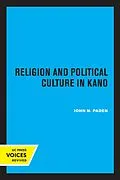Religion and Political Culture in Kano provides an in-depth exploration of how Islamic traditions have shaped political authority and community in northern Nigeria's most influential urban center. Focusing on Kano Emirate and later Kano State, the study situates religion within a wider context of urbanization, ethnicity, and class, demonstrating how Islamic law, clerical leadership, and Sufi brotherhoods became central to political life. Particular attention is given to the Tijaniyya and Qadiriyya reform movements, which redefined the structures of authority and community and provided new bases for legitimacy across ethnic lines. By tracing these developments, the book illuminates the ways in which religious values and symbols informed political organization and social integration.
Covering the transition from precolonial emirate rule through colonial indirect administration and into the era of Nigerian independence, the book analyzes how crises of legitimacy and efforts at reform repeatedly reshaped both authority and community. It examines succession and protest, the role of emirate institutions, and the transformation of local identities amid broader processes of national integration. Drawing on historical documents, survey data, and ethnographic detail, the study offers both a richly textured account of Kano's religious and political history and a framework for understanding the interplay of religion and politics in multiethnic societies.
This title is part of UC Press's Voices Revived program, which commemorates University of California Press's mission to seek out and cultivate the brightest minds and give them voice, reach, and impact. Drawing on a backlist dating to 1893, Voices Revived makes high-quality, peer-reviewed scholarship accessible once again using print-on-demand technology. This title was originally published in 1973.
Autorentext
Enter the Author Bio(s) here.
